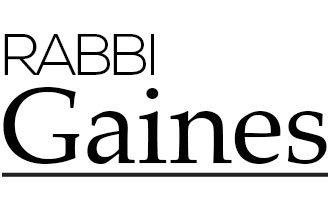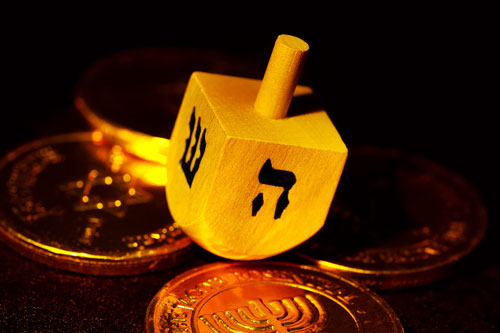Chanukah is upon us and in addition to the delectable smell of potato latkas cooking in the kitchen and the beautiful lights of the Chanukiah (Menorah possessing 8 branches) glistening from windows lining the streets, the laughter of children can be heard echoing in the hallowed halls of many a home as they busily spin the 4 sided top we call (in Yiddish) Dreidal. Dreidal (Sevivon in Hebrew) is an ancient game that is simultaneously simple and complex, i.e. simple to learn and play (even a very little child can do it), but complex (profound) in its meaning (even learned scholars contemplate its meaning).
Let’s begin our analysis by first explaining the rules of the game. The Dreidal top possesses four sides, each of which possesses a letter of the Hebrew alphabet. These four letters are called Nun, Gimmel, Hey, and Shin. The rules are are simple. Each player begins with 10-15 coins (sometimes tokens, matchsticks, or chocolates are used), and they each must place a single coin or token into the center, the “pot.” The players will now take turns spinning the Dreidal. If the Dreidal (upon completing its spin) falls on the letter Nun, the player acquires (that round) nothing. If the Dreidal should fall on the letter Gimmel, the player will acquire everything - all the coins in the pot are now his (forcing each of the remaining players to put yet another coin into the pot). If the Dreidal lands on the letter Hey, the player acquires half of the pot. Lastly, should the Dreidel land on the letter Shin, the player places a single coin into the pot. The goal of the game is then this: spin the Dreidal and land on the Hey or Gimmel (the letters that mean “half” and “all”), for only then, when you have successfully collected all the coins from the pot and the other players, is the game over. Naturally, not everyone’s first spin will land on a Hey or Gimmel (the letters that allow you to collect coins from the pot). Most players will be forced to spin again and again before their efforts are met with success.
What is the spiritual lesson?
Chanukah is about the miracle of “transformation,” the conversion of our individual and collective darkness into the very brightest of lights. But such a feat is not easily achieved, for our darkness - our evil - will not yield without a fight. To that end, we must assume that our initial efforts will be met with tremendous resistance, a resistance that will seem, at first, too mighty to overcome. It may even seem that we are powerless against it, that we lack the skill and ability to complete the mission, God forbid. But failure, Dreidal teaches, is never an end, only a crucial step on the path to success. We must be willing to “spin our Dreidal,” to take a chance, again and again until our efforts our met with success. Only then, after our considerable efforts to grow and transform, will we win back all the Divine sparks (a Kabbalistic term for the Divine lights concealed in every point of reality) from the darkness of our lesser selves. This, explain the Sages, is why these 4 letters of the Dreidal: Nun, Gimel, Hey, and Shin (that tell the story of failure and success) possess the same numerical value of “Moshiach” (“Messiah”), both of which equal 358! For it’s only when we are willing to to spin our “Dreidal” again and again, to fight for the light even in the face of darkness and failure, that we will tip the scales of redemption and merit the ultimate revelation of the Messiah (the ultimate transformation of darkness into light as explained by the Sages).
So play on and remember, your past failures are only stepping stones on the way to ultimate victory. It may be your next spin that wins all!




